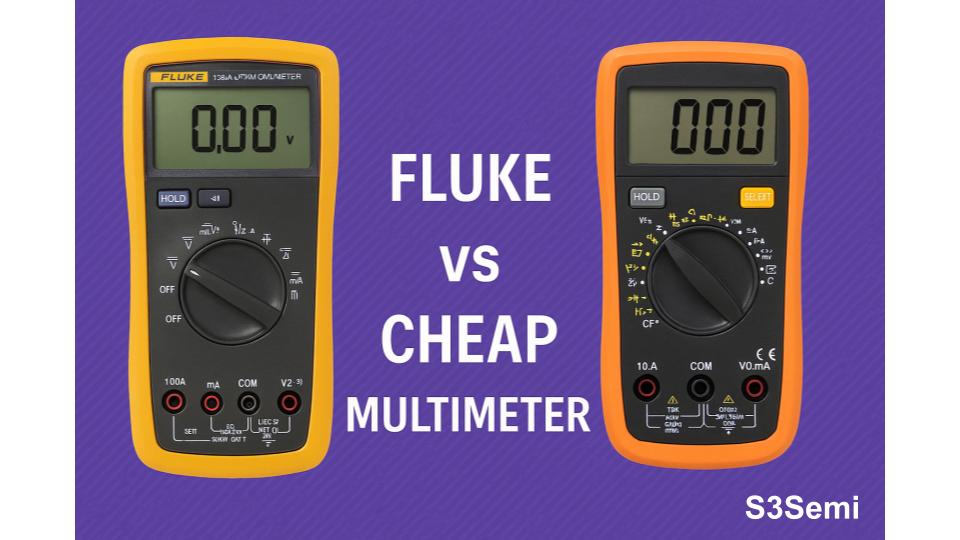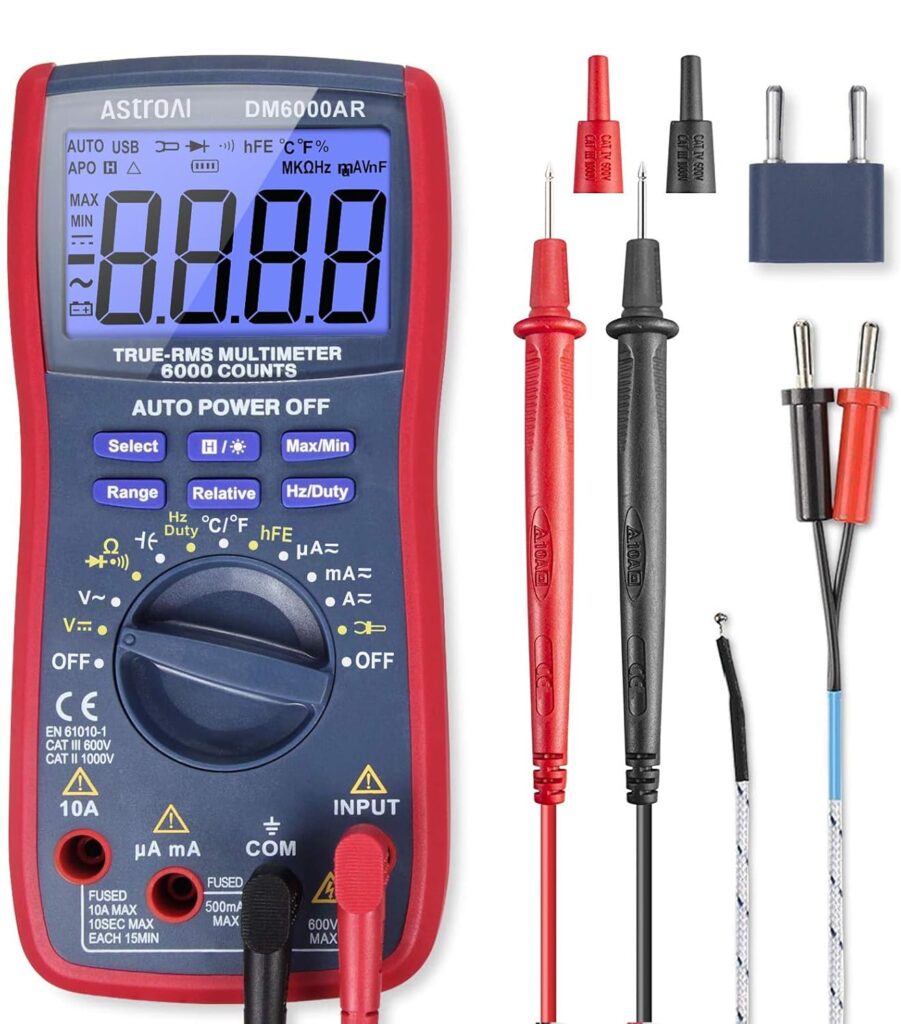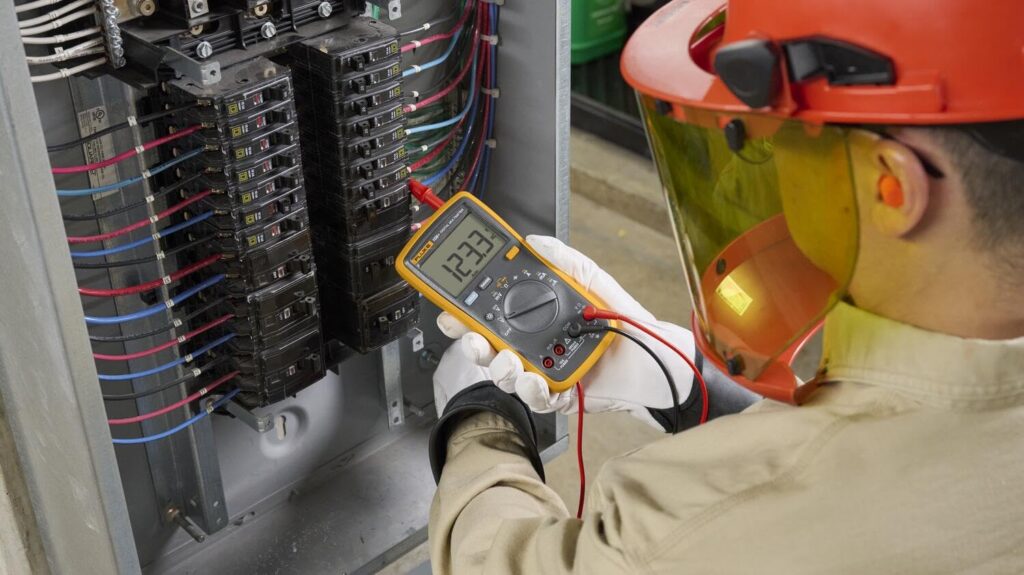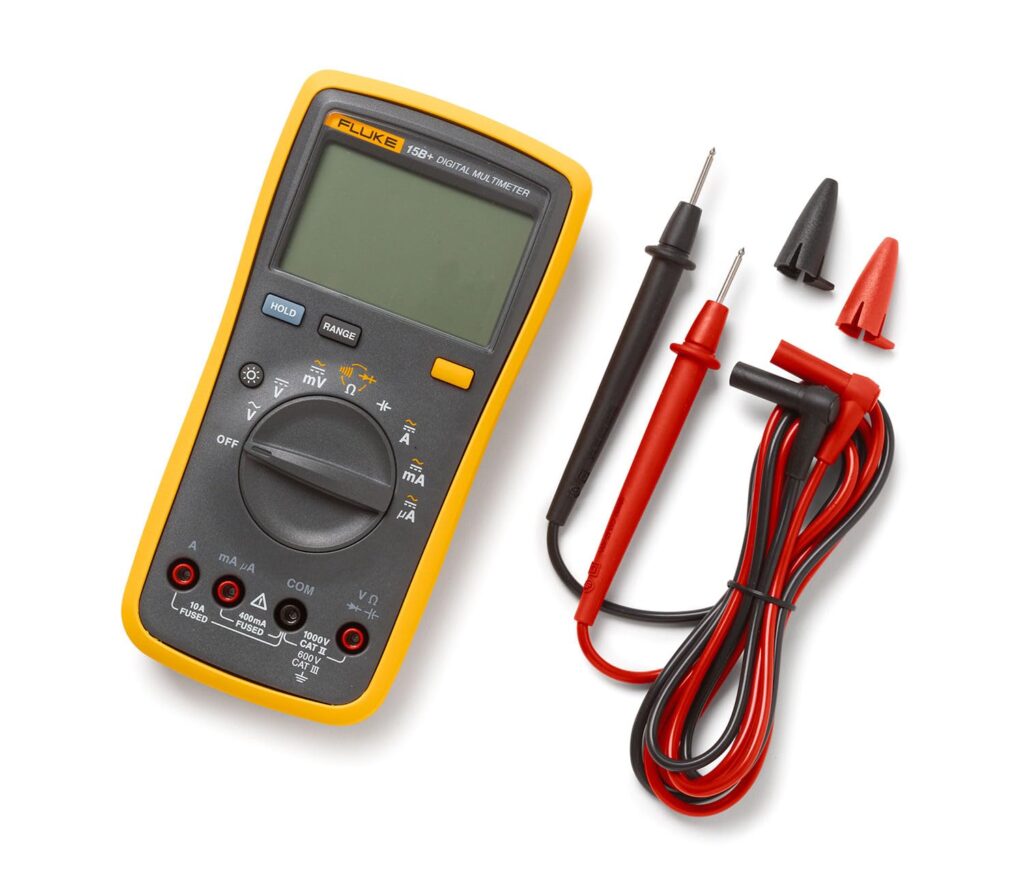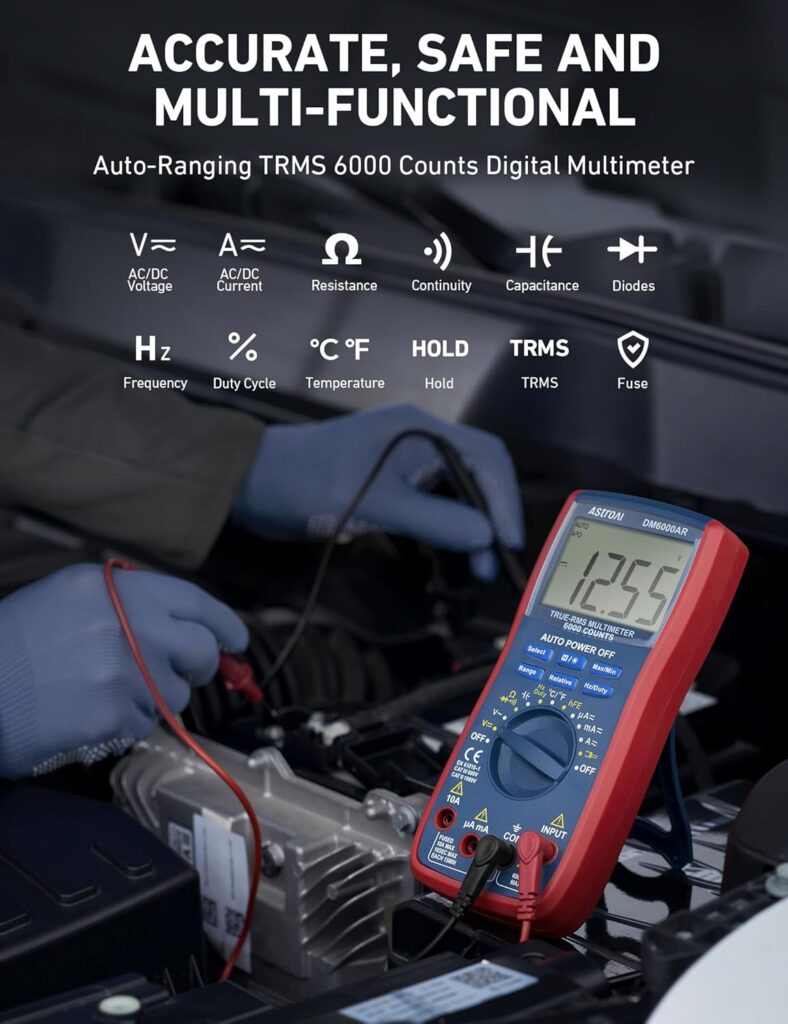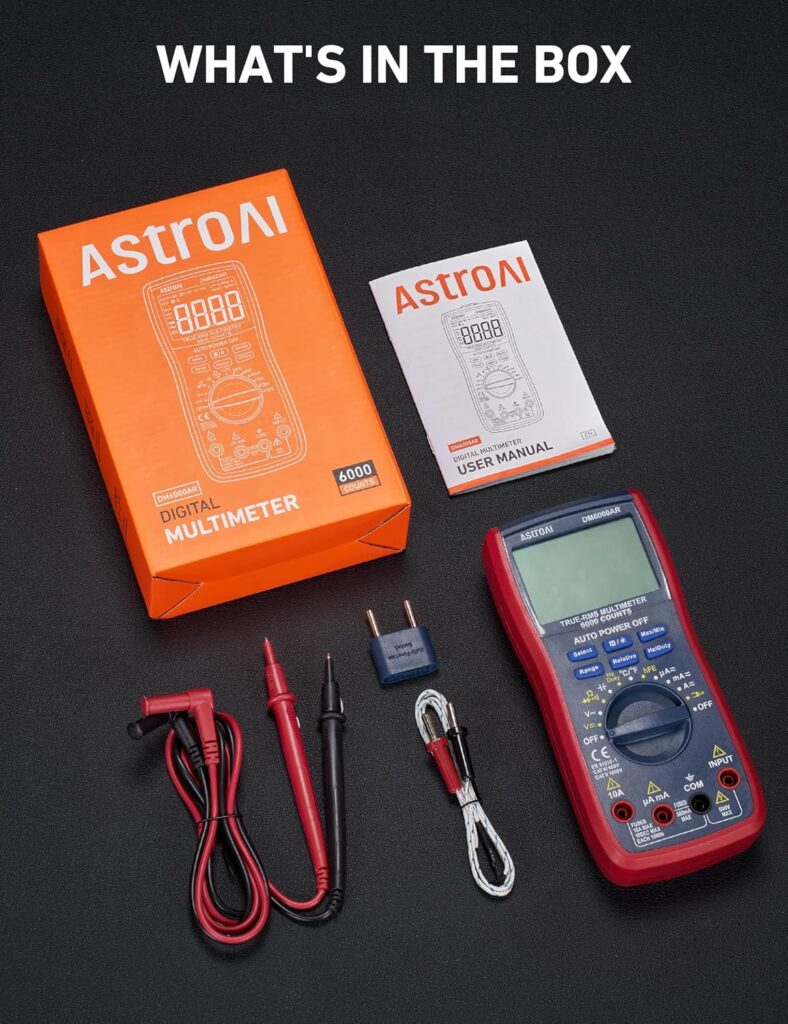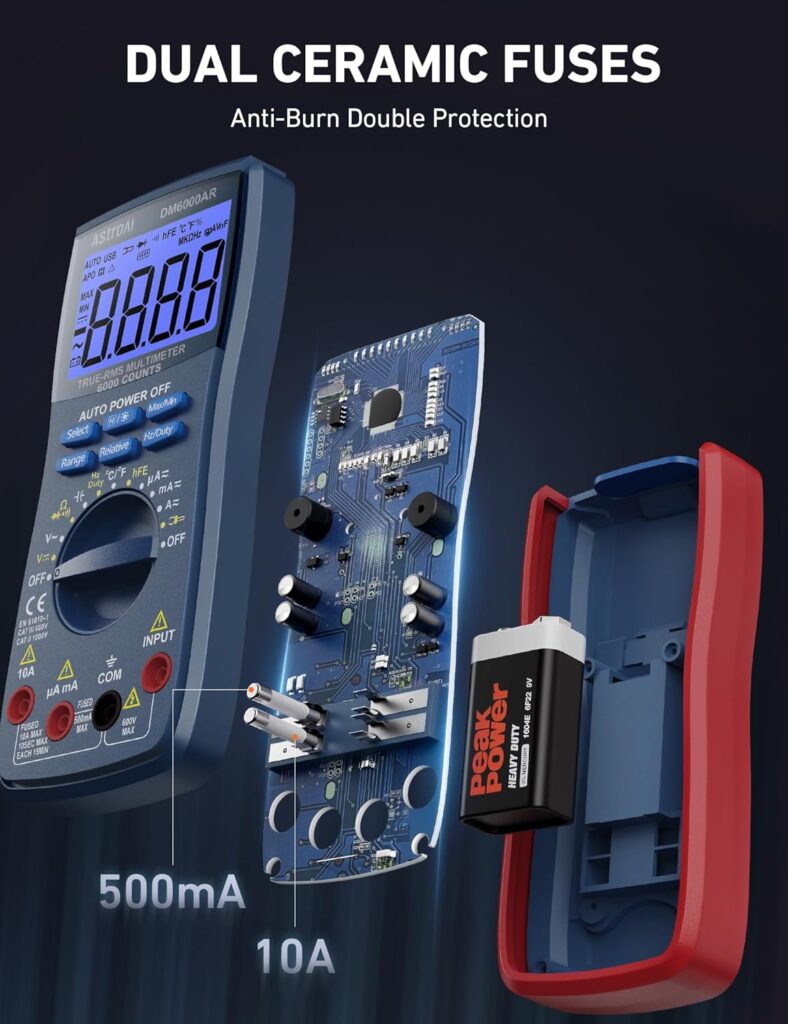Every electronics enthusiast or engineer owns a multimeter – but not every multimeter is built the same. While Fluke meters are legendary for precision and safety, cheaper brands like AstroAI attract buyers with budget-friendly prices and plenty of features on paper.
🏷️ Fluke Multimeter Deals ⭐⭐⭐⭐
So what do you actually get when you pay for a Fluke versus a low-cost multimeter? Let’s explore the real-world differences using the Fluke 15B+ and the AstroAI AST-6000-D as examples.
🧱 Build Quality and Durability
🟡 Fluke: Engineered for the Long Haul
Fluke meters are built like industrial tools — thick rubberized casings, reinforced rotary switches, and high-energy internal protection. The Fluke 15B+ meets CAT III 600 V / CAT II 1000 V safety standards, meaning it can safely measure mains voltage and industrial equipment without putting the user at risk.
These meters are designed to survive daily drops, electrical surges, and years of field use. Many professionals report using the same Fluke for over a decade with minimal recalibration.
⚫ Cheap Multimeter: Light and Disposable
Low-cost models such as the AstroAI look similar at first glance but use thinner plastic, lighter dials, and minimal input protection. There’s usually no internal shielding, and their fuses are smaller and slower-blowing.
They work fine for low-voltage circuits – Arduino boards, small batteries, or car sensors – but should never be relied on for industrial or mains-level work. As one Reddit user put it:
“Great for hobby use, but don’t stick it into a 240 V outlet unless you like surprises.”
🔍 What You’re Paying for with Fluke
Build Quality, Reliability, and Safety
The Fluke 15B+ comes with a CAT III 600V safety rating and supports AC/DC voltage up to 1000V and current up to 10A. Fluke meters are known for being built to last, with rugged housings, solid internal components, and safety features designed for professionals who work with high-energy circuits.
Many users who own Fluke meters praise their durability, long lifespan, and reliability. Common feedback highlights that Fluke devices continue to work flawlessly after years of use, even in tough industrial environments.
Fluke’s fuses, internal shielding, and true safety certifications help protect users from dangerous electrical faults. For those who work in high-voltage or commercial environments, that peace of mind is worth the higher price tag.
Accuracy and Specifications
The Fluke 15B+ offers high measurement accuracy, typically within ±0.5% depending on range. Readings are consistent across voltage, current, and resistance tests, with stable calibration over time.
Professional electricians rely on Fluke meters for traceable accuracy. The readings are not just close – they are precise enough for diagnostics, calibration, and verification of industrial systems.
Calibration, Support, and Longevity
Fluke provides calibration services, certified parts, and strong after-sales support. Many users mention that even older Fluke models remain accurate after years of service.
Fluke’s reputation is built not just on performance, but on trust – you know what your meter is telling you is correct, and that it will last a decade or more with proper use.
💡 What You Get with a Cheap Multimeter
Features for the Price
Budget multimeters like the AstroAI AST-6000-D are surprisingly feature-packed. They often include auto-ranging, temperature measurement, capacitance, and even frequency modes, all at a fraction of the cost of a professional meter.
For home users, hobbyists, and low-voltage projects, a cheap multimeter can be an excellent entry-level tool. Many hobbyists appreciate the value-for-money ratio, saying that for basic measurements, these meters perform well enough.
Trade-Offs and Limitations
However, the trade-off is in safety, consistency, and component quality. Cheap meters may advertise CAT ratings, but these are not always tested or certified to the same standard. Internal fusing and isolation are often weaker, and plastic housings may not survive heavy use.
Accuracy is another area where budget meters fall short. Readings can fluctuate or deviate by several percent, which can be acceptable for hobby work but not for professional diagnostics.
Cheap multimeters are fine for low-voltage applications like electronics, battery testing, or small appliance repair – but they’re not ideal for industrial power, mains wiring, or high-load circuits.
💡 Side-by-side Comparison
| Feature | Fluke 15B+ | AstroAI AST-6000-D |
|---|---|---|
| Build Quality | Professional-grade, rugged construction | Budget build, light and compact |
| Safety Rating | CAT III 600V, verified | Often labeled CAT III but not verified |
| Voltage & Current Range | Up to 1000V / 10A (AC/DC) | Limited voltage and current range |
| Accuracy | ±0.5% typical | Often off by up to 5–10% |
| Features | Core professional measurements | Auto-ranging, temp, capacitance, etc. |
| Display | High-contrast, fast refresh | Basic LCD, slower refresh |
| Durability | Extremely high | Moderate, not for heavy-duty work |
| Ideal Use Case | Professional electrical, industrial, or HVAC work | Home, DIY, hobby, or occasional testing |
| 💳 Pricing | 💲Check price | 💲Check price |
Fluke focuses on accuracy and ergonomics – a clear display, crisp dial clicks, and fast refresh. The AstroAI adds fun extras like a transistor socket or temperature probe, which appeal to hobbyists but are secondary to measurement quality.
🧩 Practical User Feedback
From discussions in technical communities, the general consensus is:
- Cheap meters are great for learning and simple testing
- Fluke meters are worth the investment when safety, reliability, and precision matter
- Many electricians keep both – a Fluke for professional work, and a cheap meter for rough checks or risky tasks where the meter might get damaged
One user summarized it well: “If you use a multimeter to make a living, buy a Fluke. If you use it twice a month, get the cheap one.”
💬 What Users Say
From EEVBlog Forums:
“Fluke feels indestructible – worth the price just for peace of mind.”
From Reddit r/Electronics:
“AstroAI is fine for students. But once you start troubleshooting live panels, you’ll wish you had a Fluke.”
From Amazon Reviews:
- Fluke 15B+: ⭐ 4.8 / 5 – praised for accuracy, build quality, and trustworthiness.
- AstroAI AST-6000-D: ⭐ 4.6 / 5 – praised for affordability, but with mixed comments on durability.
💰 Price and Value
| Model | Typical Price | Best For |
|---|---|---|
| Fluke 15B+ | 💲Check price | Professionals, electricians, serious engineers |
| AstroAI AST-6000-D | 💲Check price | Hobbyists, students, casual DIY users |
For professionals who depend on reliable measurements, the Fluke pays for itself quickly in accuracy, safety, and lifespan. For beginners or occasional users, a cheap multimeter is an affordable learning tool – but it’s not a lifetime investment.
✅ Final Thoughts
- Fluke Multimeter: Precision instrument designed for safety, consistency, and longevity. Ideal for engineers and technicians who need to trust every reading.
- Cheap Multimeter: Great for light-duty or educational use, but lacks the safety, calibration, and build quality required for professional environments.
In short:
Buy a cheap meter to start learning – but buy a Fluke when accuracy and safety matter.
